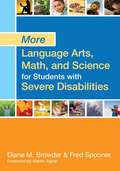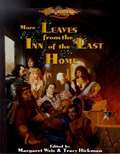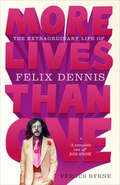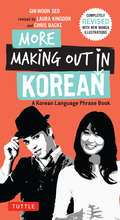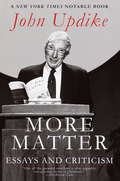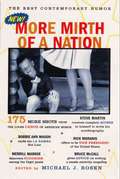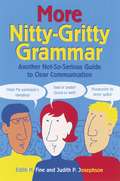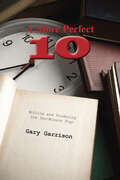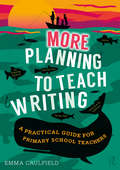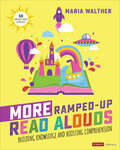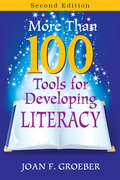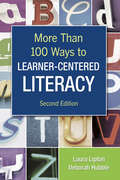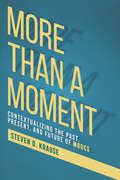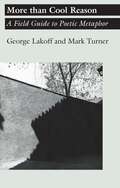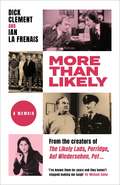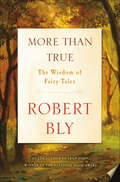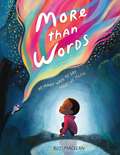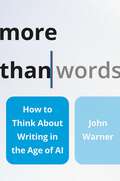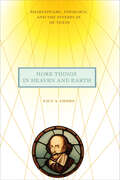- Table View
- List View
More Issues at Hand
by William Atheling Jr.James Blish, in his incarnation as "William Atheling, Jr.," has written more than his share of the most incisive criticism of contemporary science fiction. In 1964 Advent brought out The Issue at Hand, a collection of Atheling's critical essays on stories in the science-fiction magazines. Now we present a new volume which concentrates on science-fiction books. As before, Atheling's rapier skewers literary malefactors of many kinds, including some well-known authors whose great popularity is all the more puzzling because there seems to be so little reason for it. To be sure, Atheling does not stint praise where it is due--see especially the chapters on Budrys and Sturgeon--but it is in the nature of criticism that the sins and errors be dealt with in greatest detail. As Atheling puts it: "There is no such thing as destructive criticism. That is just a cliché people use to signal that their toes have been stepped on. After all, the whole point of telling a man he is doing something the wrong way is the hope that next time he will do it right. "Simply saying that a given book is bad may serve the secondary function of warning the public away from it, if the public trusts the critic. But if you do not go on to say in what way it is bad, your verdict is not destructive criticism, or any other kind of criticism; it is just abuse. "A good critic is positively obliged to be harsh toward bad work. By a good critic, I mean a man with a good ear, a love for his field at its best, and a broad and detailed knowledge of the techniques of that field. The technical critic (not, please, the scientific or technological one), should be able to say with some precision not only that something went wrong--if it did--but just how it went wrong. "In writing, as in any other art, there is a medium to be worked in, and there are both adroit and clumsy ways to work with it. The writer should know the difference between what is adroit and what is clumsy. If he does not, it is the function of the technical critic to show it to him. Technical critics are, or should be, invaluable to the writer who is serious about the lifelong task of learning his craft. "Such a critic is also useful to the reader. Here his work usually takes the form of explication du texte: he uses special knowledge to unearth and expose some element in the work of art which the ordinary reader probably did not know was there." [Adapted from the Introduction]
More Language Arts, Math, and Science for Students with Severe Disabilities
by Diane Browder Fred SpoonerA followup to the landmark bestseller Teaching Language Arts, Math, and Science to Students with Significant Cognitive Disabilities, this important text prepares teachers to ensure more inclusion, more advanced academic content, and more meaningful learning for their students.
More Leaves from the Inn of the Last Home (Dragonlance)
by Margaret Weis Tracy HickmanWelcome, guest, to our inn. To celebrate the coming of a new age to Krynn, we have devised a menu of succulent dishes we hope you will enjoy. Take a seat in your favorite booth. Order a mug of your favorite beverage. Meet new friends and share past times with old ones. Here are songs for the singing and good food for the eating. Your proprietors, Caramon and Tika Majere. Inside this volume you will find articles on many subjects, including: Que-Shue divination practices, Lord Gunthar's Last Will and Testament, Fashions of Krynn, and as always, music, recipes, kender sayings, and much more.
More Lives Than One: The Extraordinary Life of Felix Dennis
by Fergus ByrneCanny, infuriating, cynical and generous by turns, Felix Dennis was a true one-off. When he died in 2014 he was a multi-millionaire. Yet he spent his last months writing poetry and planting the millionth tree in his own forest in Warwickshire. Journalist Fergus Byrne got to know him well in this time and was granted exclusive access to Dennis's archives and papers. He found everything had been kept and, along with hours of interviews with girlfriends, family, staff and friends the world over, he has now written the only authorised biography of a man who described himself as lucky to have led several lives.His early rebellious days started with dropping out of grammar school, playing in a rock 'n' roll band, and being imprisoned (with Richard Neville and Jim Anderson) for charges of obscenity relating to a priapic Rupert Bear in the 'schoolkids' issue of the magazine Oz. The launch of Kung-Fu magazine, created when Dennis spotted a queue at a Leicester Square cinema for a Bruce Lee film, changed his fortunes. An industrious and self-destructive era then followed. He moved to America, added the magazines MacUser and Maxim to his portfolio, but also discovered crack, hookers and S & M. When his lifestyle led him to hospital, he gave up the drugs overnight and took to writing poetry. He acquired a mansion in Warwickshire, bought a much loved home in Mustique from rock star David Bowie, gave generously to charities, planted the largest broadleaf forest in Britain, and published several volumes of verse promoted by very well received readings nationwide. This is a hugely readable account of one of the most extraordinary characters of our time.
More Making Out in Korean
by Ghi-Woon SeoMore Making Out in Korea is a fun, accessible and thorough Korean phrase book and guide to the Korean language as it's really spoken. This prasebook follows the bestselling Making Out in Korea providing additional (and classic) phrases for travelers, including ones to help you make acquaintances, discuss likes and dislikes, share a meal, go out on the town or develop a romantic relationship. This Korean phrasebook includes: A guide to pronouncing Korean words correctly. Explanations of basic Korean grammar, such as, word order, questions, and formal vs. informal tenses. Complete Korean translations including Korean Script (hangul). Useful and interesting notes on Korean language and culture. Lots of colorful, fun and useful expressions not covered in other phrasebooks.
More Matter
by John UpdikeJohn Updike's fiftieth book and fifth collection of assorted prose, most of it first published in The New Yorker, brings together eight years' worth of essays, criticism, addresses, introductions, humorous feuilletons, and -- in a concluding section, "Personal Matters" -- paragraphs on himself and his work. More matter, indeed, in an age which, his introduction states, wants "real stuff -- the dirt, the poop, the nitty gritty -- and not . . . the obliquities and tenuosities of fiction." Still, the fiction writer's affectionate, shaping hand can be detected in many of these considerations. Herman Melville, Edith Wharton, Sinclair Lewis, Dawn Powell, Henry Green, John Cheever, Vladimir Nabokov, and W. M. Spackman are among the authors extensively treated, along with such more general literary matters as the nature of evil, the philosophical content of novels, and the wreck of the Titanic. Biographies of Isaac Newton and Queen Elizabeth II, Abraham Lincoln and Nathaniel Hawthorne, Robert Benchley and Helen Keller, are reviewed, always with a lively empathy. Two especially scholarly disquisitions array twentieth-century writing about New York City and sketch the ancient linkage between religion and literature. An illustrated section contains sharp-eyed impressions of movies, photographs, and art. Even the slightest of these pieces can twinkle.Updike is a writer for whom print is a mode of happiness: he says of his younger self, "The magazine rack at the corner drugstore beguiled me with its tough gloss," and goes on to claim, "An invitation into print, from however suspect a source, is an opportunity to make something beautiful, to discover within oneself a treasure that would otherwise have remained buried."From the Hardcover edition.
More Mirth of a Nation
by Michael J. RosenMore seriously funny writing from American's most trusted humor anthology Witty, wise, and just plain wonderful, the inaugural volume of this biennial, Mirth of a Nation, ensured a place for the best contemporary humor writing in the country. And with this second treasury, Michael J. Rosen has once again assembled a triumphant salute to one of America's greatest assets: its sense of humor. More than five dozen acclaimed authors showcase their hilariously inventive works, including Paul Rudnick, Henry Alford, Susan McCarthy, Media Person Lewis Grossberger, Ian Frazier, Richard Bausch, Amy Krouse Rosenthal, Nell Scovell, Andy Borowitz, and Ben Greenman -- just to mention a handful so that the other contributors can justify their feelings that the world slights them. But there's more! More Mirth of a Nation includes scads of Unnatural Histories from Randy Cohen, Will Durst's "Top Top-100 Lists" (including the top 100 colors, foods, and body parts), and three unabridged (albeit rather short) chapbooks: David Bader's "How to Meditate Faster" (Enlightenment for those who keep asking, "Are we done yet?") Matt Neuman's "49 Simple Things You Can Do to Save the Earth" (for instance, "Make your own honey" and "Share your shower.") Francis Heaney's "Holy Tango of Poetry" (which answers the question, "What if poets wrote poems whose titles were anagrams of their names, i.e., 'Toilets,' by T. S. Eliot?") And there's still more: "The Periodic Table of Rejected Elements," meaningless fables, Van Gogh's Etch A Sketch drawings, a Zagat's survey of existence, an international baby-naming encyclopedia, Aristotle's long-lost treatise "On Baseball," and an unhealthy selection of letters from Dr. Science's mailbag. And that's just for starters! Just remember, as one reviewer wrote of the first volume, "Don't drink milk while reading."
More Nitty-Gritty Grammar: Another Not-So-Serious Guide to Clear Communication
by Judith Pinkerton Josephson Hope Edith FineWho or whom? Lay or lie? Conjunction, pronoun, predicate, or gerund? If such questions and terms leave you scratching your head, you need the hip and fun follow-up to NITTY-GRITTY GRAMMAR. With a new, easy-to-use alphabetical format and the same winning formula of wacky cartoons, off-the-wall examples, and catchy reminders, MORE NITTY-GRITTY GRAMMAR will help you sidestep common bloopers, untangle your malapropisms, secure those dangling modifiers, and teach you to speak and write with clarity and confidence.From the Trade Paperback edition.
A More Perfect Ten: Writing and Producing the Ten-Minute Play
by Gary GarrisonA More Perfect Ten is a revision of Gary Garrison's pioneering book on writing and producing the 10-minute play, and it is now the most authoritative book on this emerging play form. The 10-minute play has become a regular feature of theatre companies and festivals from coast to coast, and Garrison has distilled the advice of many of those people who had been instrumental in promoting the ten minute play for the last few years.Replete with advice and tips on creating the successful 10-minute play, and cautions for avoiding the pitfalls, this new edition also includes addresses for the biggest and most important 10-minute festival opportunities, new sample 10-minute plays and questions for thought and discussion, and sample layout templates for laying out the play for submission. The savvy playwright at any level of skill can use this little book to great advantage. Plus Gary Garrison is warm, funny, irreverent, and essential.
More Planning to Teach Writing: A Practical Guide for Primary School Teachers
by Emma CaulfieldWritten by an experienced teacher and literacy consultant, this book offers an easy-to-use approach that will reduce teachers’ planning time while raising standards in writing. Building on the success of Planning to Teach Writing, it includes modern and classic picture books, short stories, and novels to provide a fantastic new range of hooks to inspire teaching and learning. Using a tried and tested planning approach and explaining how best to use baseline assessment to build upon children’s writerly knowledge and skills it help teachers to produce effective unit plans for writing, and in doing so, they will be able to concentrate on the core business of teaching units that help children to fulfil their potential as writers. The book uses a simple formula for success: Find your students' gaps in learning. Choose a hook that you know will engage your students. Select a unit plan that you know will support you to get the best writing out of your students. Tailor it to your students. Teach it! This latest book is the perfect starting point for teachers planning to teach writing in their classroom, and the new stories and activities provide fresh ideas to those who are already familiar with the circle planning approach used in Planning to Teach Writing.
More Ramped-Up Read Alouds: Building Knowledge and Boosting Comprehension (Corwin Literacy)
by Maria P. WaltherUnlock the transformative potential of read-aloud to joyfully strengthen essential literacy skills. In this eagerly anticipated follow-up to Maria Walther’s The Ramped-Up Read Aloud, discover 50 MORE read-aloud experiences designed to bolster students’ literacy development, ignite imagination, and enhance motivation. Backed by the latest research, this indispensable guide equips educators with the knowledge and tools to make read alouds a cornerstone of their teaching practice. More Ramped-Up Read Alouds includes lessons focused on foundational reading concepts like phonological awareness and decoding along with a new chapter on integrating literacy with STEAM. This must-have resource for K-5 teachers, librarians, schools, and districts goes beyond the basics. It empowers educators to elevate their read alouds, offering strategies to broaden students’ content knowledge, expand vocabulary, and boost listening comprehension. Each read-aloud experience features: Standards-based learning targets Key vocabulary words with kid-friendly definitions Effective questioning techniques Innovative reading response ideas Targeted extension activities to enhance the experience for upper elementary learners Looking to create joyful, enriching reading experiences that will lead to endless possibilities? Search no further! It’s time to make interactive read-aloud a non-negotiable part of the day—and watch learners soar!
More Ramped-Up Read Alouds: Building Knowledge and Boosting Comprehension (Corwin Literacy)
by Maria P. WaltherUnlock the transformative potential of read-aloud to joyfully strengthen essential literacy skills. In this eagerly anticipated follow-up to Maria Walther’s The Ramped-Up Read Aloud, discover 50 MORE read-aloud experiences designed to bolster students’ literacy development, ignite imagination, and enhance motivation. Backed by the latest research, this indispensable guide equips educators with the knowledge and tools to make read alouds a cornerstone of their teaching practice. More Ramped-Up Read Alouds includes lessons focused on foundational reading concepts like phonological awareness and decoding along with a new chapter on integrating literacy with STEAM. This must-have resource for K-5 teachers, librarians, schools, and districts goes beyond the basics. It empowers educators to elevate their read alouds, offering strategies to broaden students’ content knowledge, expand vocabulary, and boost listening comprehension. Each read-aloud experience features: Standards-based learning targets Key vocabulary words with kid-friendly definitions Effective questioning techniques Innovative reading response ideas Targeted extension activities to enhance the experience for upper elementary learners Looking to create joyful, enriching reading experiences that will lead to endless possibilities? Search no further! It’s time to make interactive read-aloud a non-negotiable part of the day—and watch learners soar!
More Reading Comprehension in Varied Subject Matter Level 1
by Jane ErvinThe book contains 25 selections and has the same format as other books in the Reading Comprehension series, with selections on social studies; science; literature and language; philosophy; logic and mathematics; the arts; and combined subjects.
More Than 100 Tools for Developing Literacy
by Joan F. GroeberTeachers across grade levels will find more than 100 practical tools for sharpening students' reading comprehension.
More Than 100 Ways to Learner-Centered Literacy
by Laura Lipton Dr Deborah S. HubbleThis updated edition helps beginning and experienced teachers build vocabulary skills, promote student interaction with relevant activities, strengthen fluency and comprehension, and produce meaningful student assessments.
More than a Moment: Contextualizing the Past, Present, and Future
by Steven D. KrauseAs recently as 2012, massive open online courses (MOOCs) looked poised to revolutionize higher education, but in just a few years their flaws and problems have made them into a less relevant model. In More than a Moment, Steven D. Krause explores MOOCs and their continuing impact on distance learning in higher education, putting them in the context of technical innovations that have come before and those that will be part of the educational future. Krause writes about his own experiences as a participant in several MOOCs and the experiences of faculty who developed and taught MOOCs. Contrary to many early claims from educational entrepreneurs, they were never entirely “new,” and MOOCs and their aftermath are still at the heart of the tensions between nonprofit universities and for-profit entities, particularly online program management firms, in delivering distance education. While MOOCs are no longer a threat to education in the United States, they are part of the ongoing corporatization of education and remain part of conversations about experienced-based credit, corporate training, and open education. Presenting historical, student, teacher, and administrative perspectives, More than a Moment is a well-rounded treatment that will be of interest to academics and entrepreneurs interested in distance education, online pedagogy, online program management, and public-private partnerships in higher education.
More than Cool Reason: A Field Guide to Poetic Metaphor
by George Lakoff Mark Turner"The authors restore metaphor to our lives by showing us that it's never gone away. We've merely been taught to talk as if it had: as though weather maps were more 'real' than the breath of autumn; as though, for that matter, Reason was really 'cool. ' What we're saying whenever we say is a theme this book illumines for anyone attentive. " Hugh Kenner, Johns Hopkins University "In this bold and powerful book, Lakoff and Turner continue their use of metaphor to show how our minds get hold of the world. They have achieved nothing less than a postmodern Understanding Poetry, a new way of reading and teaching that makes poetry again important. " Norman Holland, University of Florida"
More than Cool Reason: A Field Guide to Poetic Metaphor
by George Lakoff Marl Turner"The authors restore metaphor to our lives by showing us that it's never gone away. We've merely been taught to talk as if it had: as though weather maps were more 'real' than the breath of autumn; as though, for that matter, Reason was really 'cool.' What we're saying whenever we say is a theme this book illumines for anyone attentive." — Hugh Kenner, Johns Hopkins University "In this bold and powerful book, Lakoff and Turner continue their use of metaphor to show how our minds get hold of the world. They have achieved nothing less than a postmodern Understanding Poetry, a new way of reading and teaching that makes poetry again important." — Norman Holland, University of Florida
More Than Likely: A Memoir
by Dick Clement Ian le Frenais'Fabulous memoirs from the two great writers . . . I loved every second of it' Eric IdleDick Clement and Ian La Frenais's unique writing partnership has lasted over fifty years. After creating the characters of Bob and Terry, factory hands from the north-east of England, in The Likely Lads and Whatever Happened to the Likely Lads?, their reputation as great screenwriters was secured. Their acclaimed careers have included writing, directing and producing iconic TV programmes like Porridge, Auf Wiedersehen, Pet and Lovejoy. Their feature films include Otley, The Commitments and Still Crazy. Along the way, they have had unforgettable encounters with movie stars like Richard Burton, Ava Gardner, Marlon Brando, Michael Caine and Sean Connery - not to mention with stellar performers as varied as Billy Connolly, George Best, Peter Cook and Dudley Moore, Ronnie Wood and Tracey Ullman.Naturally, Dick and Ian's dual memoir is told with flair and immense humour. It is also choc-a-bloc with unexpected happenings, rogues and rock stars, prima donnas, plots and panic.
More than Nature Needs
by Derek BickertonThe human mind is an unlikely evolutionary adaptation. How did humans acquire cognitive capacities far more powerful than anything a hunting-and-gathering primate needed to survive? Alfred Russel Wallace, co-founder with Darwin of evolutionary theory, saw humans as "divine exceptions" to natural selection. Darwin thought use of language might have shaped our sophisticated brains, but his hypothesis remained an intriguing guess--until now. Combining state-of-the-art research with forty years of writing and thinking about language evolution, Derek Bickerton convincingly resolves a crucial problem that both biology and the cognitive sciences have hitherto ignored or evaded. What evolved first was neither language nor intelligence--merely normal animal communication plus displacement. That was enough to break restrictions on both thought and communication that bound all other animals. The brain self-organized to store and automatically process its new input, words. But words, which are inextricably linked to the concepts they represent, had to be accessible to consciousness. The inevitable consequence was a cognitive engine able to voluntarily merge both thoughts and words into meaningful combinations. Only in a third phase could language emerge, as humans began to tinker with a medium that, when used for communication, was adequate for speakers but suboptimal for hearers. Starting from humankind's remotest past, More than Nature Needs transcends nativist thesis and empiricist antithesis by presenting a revolutionary synthesis--one that instead of merely repeating "nature and nurture" clichés shows specifically and in a principled manner how and why the synthesis came about.
More Than True: The Wisdom of Fairy Tales
by Robert BlyThe National Book Award–winning poet examines how the enduring narratives of fairy tales capture the essence of human nature.Fairy tales have remarkable power to touch the human spirit—and they are uniquely capable of retaining that power through time and across borders. Celebrated poet and bestselling author Robert Bly has spent decades investigating the origins and meanings of these deceptively simple stories.In More Than True, Bly looks at six tales that have long captivated him, from “The Six Swans” to “The Frog Prince.” Drawing on his own creative vision, and the work of a range of thinkers from Kirkegaard and Yeats to Freud and Jung, Bly brings new meaning and illumination to these timeless tales.Along with illustrations of each story, the book features some of Bly’s unpublished poetry, which peppers his lyric prose and offers a look inside the mind of an American master of letters in the twilight of his singular career.
More than Words: So Many Ways to Say What We Mean
by Roz MacLeanIn the tradition of All Are Welcome and The Day You Begin comes a touching picture book about the many unique ways we communicate, and how we can better listen to and respect these different modes of expression. Nathan doesn't say much. He sure has a lot on his mind, though.At school, Nathan quietly observes the ways his peers communicate. Even when they’re not talking, they’re expressing themselves in all sorts of ways! By witnessing the beauty of communication diversity, Nathan learns and shows his classmates the essential lesson: Not only does everyone have something to say, but seeking to understand one another can be the greatest bridge to friendship and belonging.This tender, stunningly illustrated picture book explores and celebrates the many forms of expression—signing, speaking, singing, smiling, among others— and culminates in a poignant story about connection and understanding.
More Than Words: How to Think About Writing in the Age of AI
by John WarnerA veteran writing teacher makes a &“moving&” (Rick Wormeli) argument that writing is a form of thinking and feeling and shows why it can&’t be replaced by AI In the age of artificial intelligence, drafting an essay is as simple as typing a prompt and pressing enter. What does this mean for the art of writing? According to longtime writing teacher John Warner: not very much.More Than Words argues that generative AI programs like ChatGPT not only can kill the student essay but should, since these assignments don&’t challenge students to do the real work of writing. To Warner, writing is thinking—discovering your ideas while trying to capture them on a page—and feeling—grappling with what it fundamentally means to be human. The fact that we ask students to complete so many assignments that a machine could do is a sign that something has gone very wrong with writing instruction. More Than Words calls for us to use AI as an opportunity to reckon with how we work with words—and how all of us should rethink our relationship with writing.
More Things in Heaven and Earth: Shakespeare, Theology, and the Interplay of Texts (Richard E. Myers Lectures)
by Paul S. FiddesShakespeare’s plays are filled with religious references and spiritual concerns. His characters—like Hamlet in this book’s title—speak the language of belief. Theology can enable the modern reader to see more clearly the ways in which Shakespeare draws on the Bible, doctrine, and the religious controversies of the long English Reformation. But as Oxford don Paul Fiddes shows in his intertextual approach, the theological thought of our own time can in turn be shaped by the reading of Shakespeare’s texts and the viewing of his plays.In More Things in Heaven and Earth, Fiddes argues that Hamlet’s famous phrase not only underscores the blurred boundaries between the warring Protestantism and Catholicism of Shakespeare’s time; it is also an appeal for basic spirituality, free from any particular doctrinal scheme. This spirituality is characterized by the belief in prioritizing loving relations over institutions and social organization. And while it also implies a constant awareness of mortality, it seeks a transcendence in which love outlasts even death. In such a spiritual vision, forgiveness is essential, human justice is always imperfect, communal values overcome political supremacy, and one is on a quest to find the story of one’s own life. It is in this context that Fiddes considers not only the texts behind Shakespeare’s plays but also what can be the impact of his plays on the writing of doctrinal texts by theologians today. Fiddes ultimately shows how this more expansive conception of Shakespeare is grounded in the trinitarian relations of God in which all the texts of the world are held and shaped.

